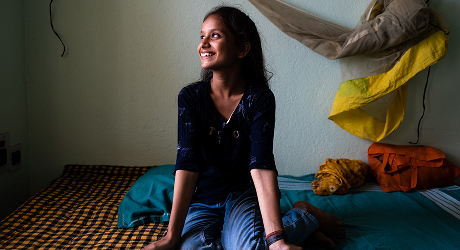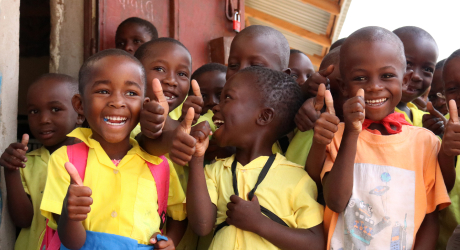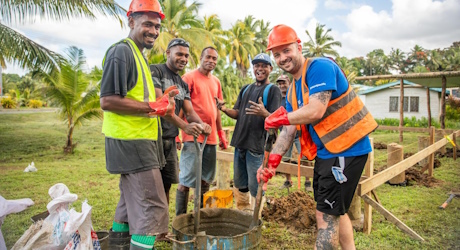Footprints Project
Since 2005, travelers like you have helped us change the world through micro-donations.

-
A total of
8160
Travelers
-
donated
$25000.71
(100% funded) -
to help improve
Equality
-
in
Viet Nam
Project Background
This projects aim is to build a safer, more inclusive city for adolescent girls (13-18 years) in Hanoi, Vietnam. It is doing so by engaging girls as active agents of change and building their individual capacity and collective agency to identify issues around their safety.
Project Activities
Girls need safe access to public spaces, increased mobility in their city and meaningful participation in urban development. By listening to their voices, and incorporating their input into city design the project is already reporting significant improvements:
- Girls are reporting increased rights awareness and confidence.
- A recent survey to measure change in girls reporting sexual harassment, and the willingness of bystanders to help, showed positive results compared with a similar survey in 2014.
- There are indications of increased awareness, attitude change and momentum amongst the transport sector and safer cities content has been built into transport sector training activities, supporting sustainability.
- Change is visible – improvements to underpasses, street lighting, community spaces and increased security are already supporting the increased mobility and safety of girls.

The success of these initiatives and support from stakeholders and community has seen the project scale up its activities. By focusing on school settings, the ongoing delivery of the Champions of Change curriculum has been cemented. This key program component is a community-based strategy promoting gender equality and social norm change through youth engagement and peer to peer mobilisation. It includes a training curriculum for adolescent girls on gender equality, empowerment, safe and inclusive cities and a curriculum for boys to challenge harmful gender norms and build a social movement for the promotion of gender equality and new models of masculinity.
Project Outcomes
This youth led design has delivered a large increase in the number of project beneficiaries. In Hanoi:
- 2.589 girls and 2,250 boys participated in project activities in schools.
- 32,000 girls and boys were reached in a short film contest.
- Awareness raising and/or training on girls safety was delivered to 260 government officials, 1502 teachers, 6300 parents and 155 local leaders.
- 1350 transit staff received training and established 'Master Trainers' for the transport sector.
- 3 underpasses were renovated.
- 10 community owned safe spaces were established.
The project was also able to support the participation and agency of adolescent girls who faced additional challenges, including out of school girls and migrant workers. In addition to the ongoing scaling of the project, a forthcoming focus will be supporting the participation of these groups, opportunity for skills training and income generating activities by linking the safer cities project with our other vocational and skills development work.
Case Study

Nguyen Phu Khanh is 26 and works as a ticket collector. He is one of 1,350 transit staff who participated in Safer Cities for Girls training.
"I found the course very helpful, it gave me knowledge about gender, gender equality, gender based violence, and especially sexual harassment. This knowledge I did not know before.
Before this training, I was not aware of the specific issues girls face when they are travelling by public transport in Hanoi. The definition of sexual harassment or gender based violence was unclear for me and I didn’t know what kind of violence would be considered gender based.
Before I attended the training, I witnessed cases of sexual harassment on buses, but I didn’t realise that it was. One time, I heard a girl screaming and other passengers making noise to a perpetrator. I myself didn’t know how to react at that time. In Vietnamese culture, the border between teasing and sexual harassment is very unclear. Sometimes, men thought that kind of action is more teasing, but now I would see this behaviour is not acceptable. It is sexual harassment”.
The training has changed Khanh’s work practices. “I also communicated with my family, friends and colleagues on the issue of safety for girls in public spaces and in using public transport”. Khanh thinks the project’s comic books, on girls safety on public transport, is an interesting way to sensitise passengers. He distributes these when he collects tickets.
“The project is doing a lot to raise peoples’ awareness. I saw communication messages on the sides of buses and posters at ticket booths and transit stations. We should use very bold messages. The project has really created ways for bus drivers and ticket collectors like me, contributing to making Hanoi safer for girls through our daily work”.

What Next?
As the Safer Cities project is rolled out in other cities around the world, new challenges are faced in each context. For example in Kampala, Uganda additional work is being done to address the specific needs of young mothers and in all environments it’s been recognised that there is a need for greater consideration of women with disabilities.
The model is also connecting women with other aspects of Plan’s work, including creating pathways to decent employment and a groundswell of support is emerging.
On the back of this work Plan has launched a ground breaking crowdmap – Free to Be – which gives girls the chance to share their experiences in public places by dropping pins on city maps where they have faced sexual harassment, exploitation and insecurity. So far, girls and young women living in Delhi, Kampala, Lima, Madrid and Sydney have contributed more than 21,000 testimonials to Free to Be. The analysis of their stories led to the report, Unsafe in the City, which found that in all five cities, boys and men grope, chase, stalk, leer at, verbally insult, and flash girls and young women.
It found this behaviour is condoned by society with authorities rarely taking action, and bystanders usually doing just that – standing by. This forces girls to adjust their behaviour to protect themselves.
Whilst contexts may change it is expected that the success of the Vietnam project will have benefits for women globally as Plan rolls out the Safer Cities model around the world.
Traveling soon? When you buy travel insurance with us, you can make a contribution towards a cause you care about.
Get a quote






